Questa volta abbiamo cercato: Redditors who work in “soft” fields like philosophy, art, or literature, what are some recent breakthroughs that we may not have heard about?
Redditors who work in “soft” fields like philosophy, art, or literature, what are some recent breakthroughs that we may not have heard about?
Ed ecco le risposte:
So I don’t know if this applies, but I’ll take a stab.
I work as a band director and I’d like to say that my profession is getting insane.
The marching arts has improved exponentially in the last 15 or so years. The pageantry, technology, and most importantly… the sheer skill/musicianship has exploded. There has never been a more exciting time to watch marching bands, and with the exception of COVID, it’s only gonna get better.
This is due largely to the wide influence of Drum Corps International, raised support and awareness in public schools, and the highly collaborative and hard working network of music educators in this country.
It’s amazing and I love it so much.
There are hundreds of great illustrations, 3D models, animations, etc. that are created around the world almost everyday. Each of these are made by an artist(s) that most likely have their own unique process or style of work. I don’t know if that counts as a “breakthrough” for the world of art itself, but it means a lot to the individual creators and the people who admire their work.
If I had to pick an example of innovation in art, I suppose Spider-Man: Into the Spider-Verse would be a good example. But, I think everyone already knew about the unique animation in the movie.
Almost forgot about Vantablack. I don’t know if it counts as recent but I thought it was a pretty cool innovation my teacher mentioned a few years ago.
I am not sure this counts but that writing samples can be used to predict Alzheimer’s. Put some smart people with English degrees in touch with some scientists and lets do this.
In some some departments of history of medicine there is a concerted move to no longer speak academically and I think that’s kinda cool. The argument is that as medicine pervades so many aspects of society, more folk should understand it – to do that, more people need to actually be able to read the history put out by historians of medicine and gain a better picture of where medical practices and norms came from.
This also goes hand-in-hand with a general push for medical literacy, and trying to create a space in which medical knowledge can not only be shared, but be examined and understood outside of medical institutions.
Philosophers don’t have breakthroughs. We just endlessly try to prove each other wrong, and then prove that the people who proved us wrong are really wrong. Oh, and argue about which of us are “real” philosophers and what philosophy actually is. But Bill Clinton kinda stopped us all in our tracks when he showed us that none of us know what the definition of “is” is.

